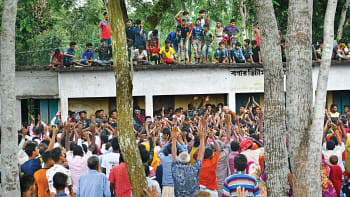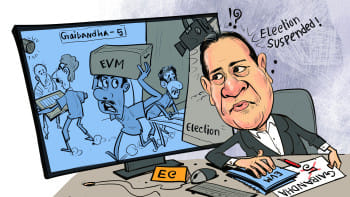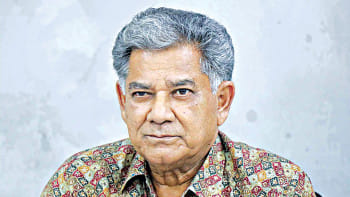EC shows rare courage, but will it be enough?

That a day would come when the Election Commission would do anything beyond perfunctory efforts to stop electoral irregularities was unthinkable even a few days ago. But the unthinkable has happened. The suspension of the Gaibandha-5 by-poll, after voting was stopped in 50 out of 145 centres amid widespread irregularities and a mass boycott by all but one candidate, is an extraordinary move, an exercise of the highest power granted to the EC. We welcome the EC for showing such courage – a rarity for bureaucrats-turned-commissioners – which is perhaps the only silver lining to an otherwise botched operation. But courage alone will not be enough to ensure fair elections, nor can it make up for the EC's – and by extension, the administration's – inability to control the Gaibandha situation.
The suspension decision has, justifiably, stunned both political parties and election observers, who noted its unprecedented nature in the recent history of parliamentary elections. But too much focus on the merits of the decision risks taking away from the fact that serious irregularities did occur, in the presence of election and law enforcement officials no less. The EC cited irregularities including illegal presence of individuals in polling booths, voters being forced to vote for a certain candidate, criminals cutting the cables of CCTV cameras, etc. The situation was "out of control", it said. Some candidates also alleged that their agents were forced out of the centres. An independent candidate even said that Awami League men didn't allow him to cast his own vote.
So, while it's true that the EC took a drastic decision in its first brush with parliamentary elections, it is also true that it did so in the face of tremendous odds. If this is a sign of things to come, we have every reason to worry about the upcoming national election. Right now, the challenge for the EC is to get the Gaibandha-5 by-poll back on track. But it also has to investigate all reported irregularities and the potential complicity of election officials, and punish those responsible. Otherwise, all this will amount to nothing but a token concession to disgruntled opposition parties.
Until Wednesday, the EC largely appeared to be appeasing the ruling party in election-related decisions. It allowed the use of electronic voting machines (EVMs) in the upcoming national election, despite protests from most political parties. It refused to punish high-profile violators of electoral codes. It failed to send a strong message to field-level administrators – deputy commissioners (DCs) and superintendents of police (SPs) – after their grievous misconduct in a recent conference. As well as setting examples of neutrality and transparency in all its actions and preventing any collusion among election officials and the ruling party, the EC also has to figure out a way to secure unconditional support from the administration.
This is a tall order indeed, and we remain unconvinced that the EC can navigate all these challenges and hold fair elections on its own. This is why the support of all stakeholders, especially the ruling party and the administration, is vital. The public has grown tired of watching violent and non-participatory elections year after year. The authorities must find a way to avoid that in the future.


 For all latest news, follow The Daily Star's Google News channel.
For all latest news, follow The Daily Star's Google News channel. 








Comments